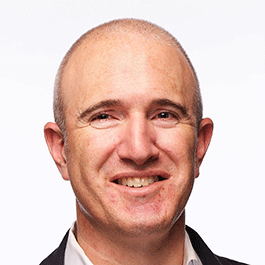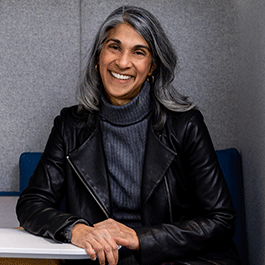Starting with Synthetic Biology
New Farley Center course leverages case studies and expert guest speakers to explore commercial innovation in the fast-moving synthetic biology industry.

Northwestern University MBA student Kyle McNulty smiled when he saw the course listing for ENTREP 395/495: Entrepreneurship in Synthetic Biology.
As a summer 2023 intern at In-Q-Tel, a venture capital partner for the US intelligence community, McNulty became increasingly fascinated by synthetic biology’s varied applications and its dynamic future. The opportunity to learn more about the emerging field excited McNulty and sparked his enrollment in the new Farley Center for Entrepreneurship and Innovation course taught by serial entrepreneur Matt Barnard (BA BM ’95), the cofounder of One Bio and indoor vertical farming company Plenty, and Lisa Dhar, associate vice president for innovation at Northwestern.
“I was sold right when I read the course description and saw the teachers,” McNulty said.
And the fall 2023 course did not disappoint.
Through case studies and guest speakers, McNulty discovered the far reach of synthetic biology, a fast-emerging science touching industries from agriculture and healthcare to national defense and consumer products like beverages and cosmetics.
“The relevance of applying modern computing concepts to biology is huge and the potential for massive change to come in the field is even bigger,” McNulty said.
An emerging area, a Northwestern strength
The course was conceived by Barnard and two of Northwestern’s faculty-entrepreneurs: Milan Mrksich, founding director of Northwestern’s Center for Synthetic Biology (CSB), Henry Wade Rogers Professor of Biomedical Engineering, and former vice president for research; and Josh Leonard, professor of chemical and biological engineering at Northwestern Engineering and a member of the CSB. Given the timeliness of the technology, its broad applications, and the University’s positioning in the field, the group wanted to create a platform to immerse Northwestern students in the highlights and challenges of translating cutting-edge technologies.

“Northwestern’s unique combination of strengths — with a top three center for synthetic biology, a top global business school, leadership in materials science, and an exceptional computer science program — all within a top 10 university, made it fun for me to participate in this fusion. I believe Northwestern will lead the world in this century of powerful, sustainable biology, and I'm excited to play any role in that,” Barnard said.
The course was designed to provide a rich overview of commercial innovation in the synthetic biology industry to entrepreneurial-minded students interested in business, science, and engineering. The instructors leaned heavily into case studies and weekly seminars from guest speakers in Barnard’s network to provide illustrative, thought-provoking lessons. The guest speakers included:
- Jason Kakoyiannis, cofounder of Ferment, a unique venture studio in synthetic biology partnered closely with Gingko Bioworks
- Gareth Asten of Acre Venture Partners, a leading investment firm dedicated to enabling fundamental changes in food and agriculture
- Tom Hayes, cofounder of Evolutionary Scale, launched by ex-Meta researchers revolutionizing protein design with groundbreaking large language models
- Rachel Konrad (BS BA '93), lecturer at the Stanford Graduate School of Business and chief brand officer at the venture fund The Production Board, and former chief communications officer who built the brand for Impossible Foods as well as director of communications reporting to Elon Musk at Tesla
- Carmichael Roberts, co-lead of the Investment Committee at Breakthrough Energy, an investment firm founded by Bill Gates to pursue technologies and solutions to reach net-zero emissions, and founder of Material Impact, a venture fund focused on deep technology companies powered by materials science
 Along the way, the instructors injected their own experiences to provide students additional viewpoints. Dhar explained her background moving early-stage technologies into the marketplace, which helped students understand how external agencies and investors evaluate startups. Barnard spoke candidly about the challenges of building companies from novel technologies.
Along the way, the instructors injected their own experiences to provide students additional viewpoints. Dhar explained her background moving early-stage technologies into the marketplace, which helped students understand how external agencies and investors evaluate startups. Barnard spoke candidly about the challenges of building companies from novel technologies.
“The professors brought so much expertise and insight to every class, which was inspiring and challenged me to look at ideas in new ways,” said Maria Chebli, a sophomore majoring in economics and political science who also relished the diversity of her classroom peers, which included MBA students, graduate students in the biotechnology program, and PhD candidates. “Everyone brought an interesting perspective to the class and their own unique angle or lens to view the material.”
Jane Baur, a student in the Master of Science in Biotechnology program, summarized her experience: “As someone with no prior entrepreneurial experience, I loved how the class seamlessly blended my passion for life sciences with new entrepreneurial insights, making it a uniquely enriching experience,” she said.
Building an entrepreneurial toolkit
To conclude the course, students were tasked to analyze an existing synthetic biology company, evaluating everything from the company’s foundational intellectual property and go-to-market strategy to its value proposition, commercial status, and outlook, by applying knowledge gleaned from the case studies and guest speakers.
“Synthetic biology will have a profound impact in the coming century, as the industry will transition to growing rather than building, mining, or extracting. It’s just so much more powerful and sustainable than the resource-intensive core technologies of industry over the last 300 years. This budding century of biology has been made possible, necessary, and urgent by the century of chemistry, silicon, and information that came before it. But with all that promise and urgency, its easy to get pulled into being everything to everyone” Barnard said. “Through real-life case studies, guest speakers, and our own insights as instructors and entrepreneurs, we want to illuminate for students the criticality of delivering a focused product against a perceived pain point with awareness of your unique strengths and capabilities."
With its focus on actual companies and principles, not simply theories, as well as guest speakers offering earnest thoughts, Chebli looked forward to every class. Initially enrolling in the course to learn about an emerging, specialized field of entrepreneurship, she found herself getting an “honest and uncensored” look at entrepreneurship that opened her mind and highlighted commercial realities.
“It was the best class I’ve taken at Northwestern,” Chebli said. “To interact with passionate, knowledgeable, and experienced people who didn’t sugarcoat their experiences was truly invaluable.”
For McNulty, who recently spent two weeks on a Levy Inspiration Grant in Southeast Asia studying synthetic biology and sustainability technology with founders and investors in that region of the world, ENTREP 395/495 only intensified his interest in a lively, rapidly evolving field hungry for new ideas.
“Thanks to this course, synthetic biology became so much more approachable than I ever thought,” McNulty said.
